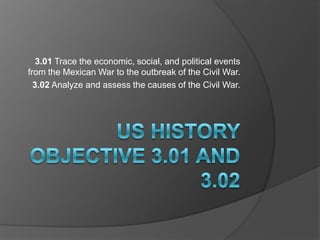
Road to the civil war (1)
- 1. 3.01 Trace the economic, social, and political events from the Mexican War to the outbreak of the Civil War. 3.02 Analyze and assess the causes of the Civil War.
- 2. Review Expansion of slavery is dividing North and South North abolitionist movements ○ William Lloyd Garrison, Frederick Douglass, Sojourner Truth, Nat Turner’s Rebellion South defend slavery as “necessary evil” ○ Economy depends on Slave labor Westward expansion will increase these tensions as southerners look to expand slavery
- 3. Missouri Compromise Review 3 parts of the Missouri Compromise ○ Maine admitted as Free State ○ Missouri admitted as Slave State ○ 36’30” line divides country (above is free and below is slave) Westward expansion will create the need for a new compromise over expansion of slavery
- 4. Clay’s Compromise of 1850 Westward expansion opens debate of slavery Henry Clay- known as the Great Compromiser Compromise of 1850 California admitted as a Free State Congress passes the Fugitive Slave Act ○ Requires citizens to turn in any slave that is attempting or has escaped ○ Failing to turn these people in will result in punishment by law ○ Southern states will favor this act
- 5. Compromise of 1850 1) California admitted as a free state 2) Green- free states and territories 3) Yellow- slave states and territories 4) Purple- open to slavery
- 6. Kansas-Nebraska Act (1854) This act will reverse the Missouri Compromise Stephen Douglas will promote the idea of popular sovereignty States will now have the right to vote on being slave or free Based on Ideas of 10th Amendment Powers not delegated to US, are reserved to states or the people
- 7. Kansas-Nebraska Act (1854) 1) Light Green- slave states 2) Light Pink- free states 3) Brown- now open to popular sovereignty
- 8. Bleeding Kansas Since Kansas can now vote on being a slave or free state a showdown is set. Pro-slavery and anti-slavery supporters move into Kansas to influence the vote Lead to bloodshed and fights between pro and anti- slavery groups
- 9. Other Events Underground Railroad Movement of slaves to the North and Canada using secret hideouts Reason South calls for Fugitive Slave Law Harriet Tubman is famous conductor of the Underground Railroad
- 11. Other Events Cont. John Brown’s Raid John Brown will raid a federal weapons arsenal in Harper’s Ferry, Virginia Brown wanted to give weapons to slaves to start a revolt Brown and his men will be captured and hung
- 12. John Brown
- 13. Other Events Cont. Harriet Beecher Stowe Write book Uncle Tom’s Cabin in 1852 Book describes the humanity of slaves and the inhumanity of slavery North- use this to defend abolition South- say the book is full of lies and be angered by what they see as false information Stowe will be called “The little lady who started the big War” by Pres. Lincoln
- 14. Sumner-Brooks Affair 1856 South Carolina Senator Preston Brooks attacks Massachusetts Senator Charles Sumner on Senate floor in Washington, DC
- 15. Dred Scott v. Sandford March 1857 Dred Scott- slave suing for freedom (living in free territory) Court ruling 1. Slaves were not citizens and could not sue in federal court 2. Missouri Compromise unconstitutional- US could not forbid slavery in any territory Reaction Further divide North North outraged and South South- supportive over slavery issue
- 16. Rise of Republican Party and Lincoln Republican Party- form around one issue---- Abolish Slavery Gain in strength throughout the 1850s Most famous and influential leader will be Abraham Lincoln
- 17. Abraham Lincoln Lincoln-Douglas Debates During the Senate Race in 1858 Lincoln (Republican)- did not want immediate end to slavery but supported an end to expansion of slavery Stephen Douglas (Democrat)- supported popular sovereignty Lincoln will lose the election His ideas will become central to Republican Party and help him win presidential election in 1860
- 18. Election of 1860 4 Candidates Lincoln- Republican 2 Democrats- split the vote 1 third party Lincoln wins without a single electoral vote from South (South feels as if their votes no longer matter) Immediate result- Southern states start to secede (led by South Carolina)
- 19. Election of 1860 *Lincoln wins without getting a single electoral vote from South
- 20. Southern Secession After Election of 1860- southern states secede (leave) the Union Led by South Carolina Set up the Confederate States of America ○ Constitution will permit slavery and give states most power Elect Jefferson Davis as President of the Confederate States